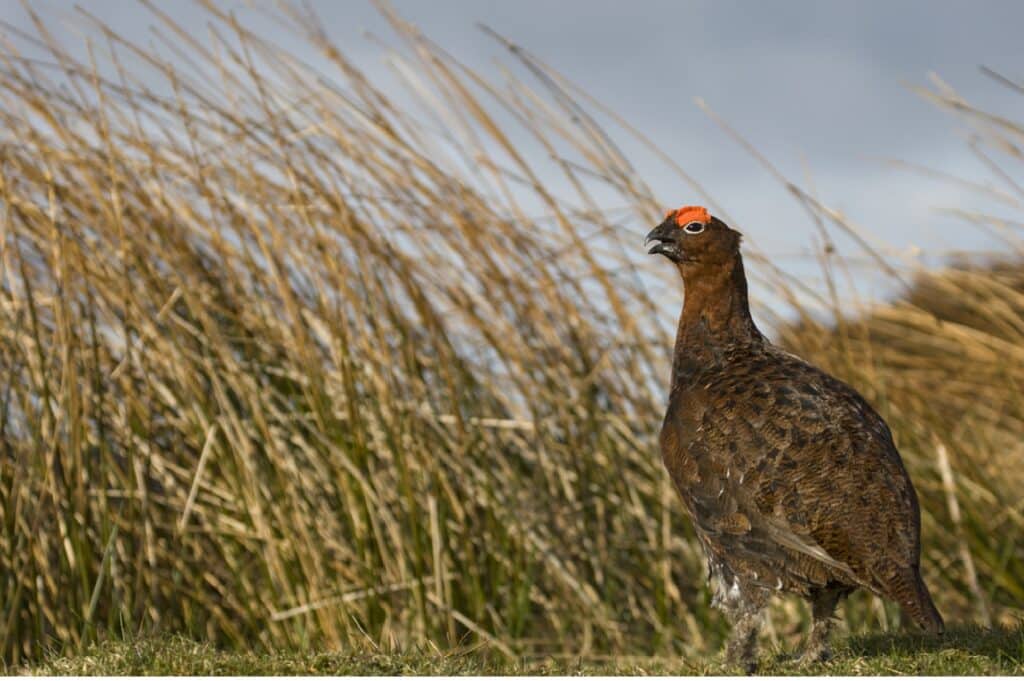As reported by Alex Thomson of Channel 4, “United Utilities, the largest corporate landowner in England, is pulling grouse shooting on its moorland by way of not renewing its leases when they come to an end. Its grouse shooting leases cover many high profile moorland landscapes, including the Forest of Bowland AONB, the Goyt Valley, Longdendale Valley, and the West Pennines. With this in mind, this is a major shift in direction which opens up these spaces for natural recovery. United Utilities told Channel 4 News “We made the decision some time ago not to issue or renew any leases on a long term basis …where we own the sporting rights…to ensure the best possible outcomes for water quality…”
Well done to Wild Moors in helping to secure this major win.
Grouse Moors and the ‘Licencing Lifeline’
The grouse shooting industry is not a ‘glorious’ tradition. It is the slaughter of up to half a million grouse a year, the destruction of countless native predators in traps and snares, illegal raptor persecution and poison baits, and the burning of internationally-scarce habitats. All so that a few people can spend the day in the uplands and in our national parks ‘enjoying’ a hobby that epitomises an outdated mindset and is ethically inexcusable.
Rather than ban it outright (which is what Protect the Wild is working for), an unfortunate halfway house is being increasingly touted as a way of controlling all this chaos and dead wildlife. Licencing.
Licencing grouse moors would, apparently, involve a shoot obtaining an operational licence from a regulator which would, at minimum, have conditions attached mandating the shoot follows wildlife and environmental protection codes of practice and laws. Where there is evidence suggesting that a shoot has failed to follow those conditions the licence can be withdrawn, even if the evidence pointing to criminality is less than sufficient to merit criminal proceedings.

Legislation already exists
It’s understandable why a ‘licencing lifeline’ appeals to some people, but legislation already exists which is meant to protect wildlife and the environment. It’s failed. The issue is that enforcement is lax or non-existent. No details have been put forward that convince us that enforcement will be stepped up or that estates or their employees will help investigators or the police to catch lawbreakers.
Estates don’t want ‘licencing’ – in fact, like fox hunters before them, they don’t want any form of control at all. Just like fox hunters they will be uncooperative and will work to exploit any exemptions (and any biases). Hoping that owners and keepers will accept and self-enforce any licencing conditions is pie in the sky thinking.
Besides problems of enforcement, the conservationists that back licencing are essentially saying that it’s okay to kill up to 500,000 wild birds (Red Grouse) every year for ‘sport’. We don’t agree. It’s not okay at all.
Licencing legitimises so much slaughter
Unlike, say, the ban on killing mammals that the Hunting Act 2004 was supposed to ensure, licencing also legitimises the ‘legal’ killing of countless numbers of foxes, corvids, stoats/weasels, and other native animals. The killing will carry on as it does now. There is no obligation to carry out ecological assessments. No checks and balances. No need to even keep count and report just how many animals estates are killing (Protect the Wild wants that to change). Predators are simply assumed to impact shooting’s profits which is why moorlands are run the way they are and why illegal raptor persecution and #collateral damage’ is so widespread.
Having killed millions upon millions of grouse and other native animals year after year, having committed wildlife crimes for decades, and having intentionally set fire to those carbon-storing peatlands, estate owners will be offered licences that not only permit all this slaughter and habitat destruction but officially sanctions it.
Licencing means never shutting down grouse moors
And once grouse shooting is licenced by the government, getting rid of it will be even more difficult. ‘We’ve done what you antis asked for’, they’ll say. And they’ll be right…We’ll have walked straight into a licencing dead-end with no room for manoeuvre.
Licencing grouse shooting estates is not the answer to all the problems they cause. Shutting them down is. That’s never been so achievable. In the next few years (or the next twenty-five, who knows) the grouse shooting industry will be shut down. Whether that’s through public revulsion at the killing of millions of sentient animals for fun, the impact of the climate crisis on land use, or the ongoing catastrophic decline in our biodiversity – most likely a combination of every issue that this horrible industry impacts – it will happen.

